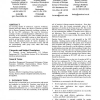HCI
2007
15 years 3 months ago
2007
This article seeks to close the gap between software engineering and human-computer interaction by indicating interdisciplinary interfaces of SE and HCI lifecycles. We present a cr...
110
Voted
BCSHCI
2008
15 years 3 months ago
2008
Ensuring good usability can be seen as the key success factor in our whole digital world: technology must support people. In particular, Medicine and Healthcare are currently subj...
BCSHCI
2007
15 years 3 months ago
2007
An increasing number of conferences, symposia, workshops, journals and books address the subject of emotions and their role in Human-Computer Interaction, including workshops at t...
IE
2007
15 years 3 months ago
2007
The telling and understanding of stories is a universal part of human experience. If we could reproduce even part of the process inside a computer, it could expand the possibiliti...
125
click to vote
UML
2000
Springer
15 years 5 months ago
2000
Springer
The UML is recognized to be the dominant diagrammatic modeling language in the software industry. However, it's support for building interactive systems is still acknowledged ...
APCHI
2004
IEEE
15 years 6 months ago
2004
IEEE
We interviewed 26 information architects about their work, their backgrounds and their perceptions of their roles as information architects. Our research aimed to identify and unde...
IFIP
1994
Springer
15 years 6 months ago
1994
Springer
This article outlines a number of important research issues in human-computer interaction in the e-commerce environment. It highlights some of the challenges faced by users in bro...
160
click to vote
VR
1999
IEEE
15 years 6 months ago
1999
IEEE
The study of human-computer interaction within immersive virtual environments requires us to balance what we have learned from the design and use of desktop interfaces with novel ...
122
click to vote
UIST
2000
ACM
15 years 6 months ago
2000
ACM
We describe sensing techniques motivated by unique aspects of human-computer interaction with handheld devices in mobile settings. Special features of mobile interaction include c...
126
click to vote
IUI
2000
ACM
15 years 6 months ago
2000
ACM
This paper describes the design and implementation of the Office Assistant – an agent that interacts with visitors at the office door and manages the office owner’s schedule. ...


